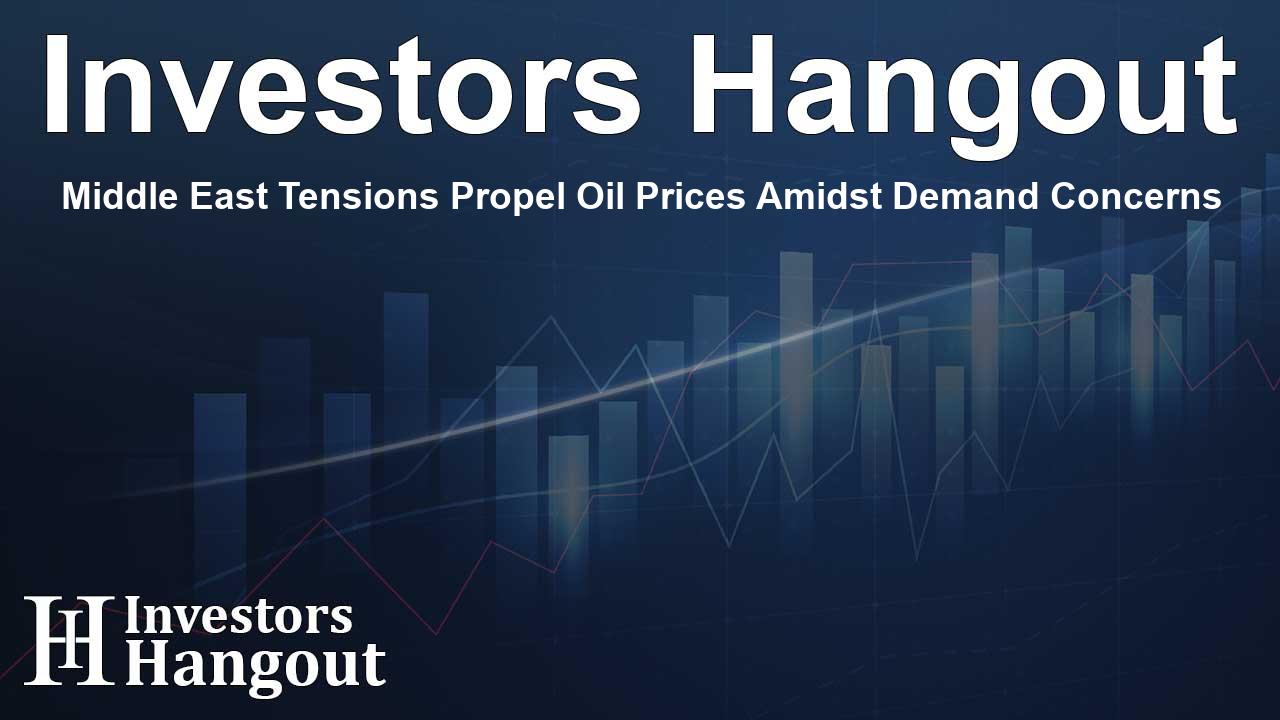Middle East Tensions Propel Oil Prices Amidst Demand Concerns

Oil Prices Surge Amid Middle East Unrest
Oil prices have seen a significant increase lately, recovering some losses from earlier in the week due to rising tensions in the Middle East. Recent reports indicate that Iran may be planning a retaliatory strike against Israel, which has heightened concerns in the crude market.
Signs of Conflict Escalation
According to Israeli intelligence, Iran is reportedly preparing to launch an assault on Israel from Iraqi territory in the coming days. This development follows Israel's previous military actions against Iran, fueling fears that the conflict could escalate further.
This potential destabilization in the Middle East adds an extra layer of risk to the crude oil market, as any military action in this oil-rich region can impact overall supply and prices dramatically.
Market Movements and Weekly Trends
Despite the recent rise in prices, crude oil contracts have experienced a downturn, with expectations that they will fall around two percent this week following a significant more than six percent drop on Monday. The fluctuations can be attributed to Israel's restrained measures over the weekend, which decreased the anticipation of a vast regional conflict.
The ongoing series of retaliatory strikes between Israel and Iran highlights the volatility of the region and its implications for crude oil supply chains.
The Role of Chinese Manufacturing in Oil Prices
In addition to geopolitical tensions, the crude market has found support from positive developments in China's manufacturing sector. Recent reports confirm that manufacturing activity reverted to growth in October, signaling strength in the world's second-largest economy and its position as the largest crude importer.
The Caixin/S&P Global manufacturing PMI rose to 50.3 in October, surpassing both the previous month's figure of 49.3 and the projected 49.7. This growth is believed to be propelled by various stimulus measures introduced by the government to enhance economic stability.
OPEC+ Supply Dynamics
Another factor contributing to the oil price shift is the speculated delay by OPEC+ regarding their planned increase in oil production scheduled for December. Concerns over reduced demand and increasing supply pressures have led the organization to reconsider their earlier plans.
Initially, OPEC+, which encompasses the Organization of the Petroleum Exporting Countries along with Russia and allied producers, aimed to boost production by 180,000 barrels per day in December. However, a previous delay from October due to lower prices signals a cautious approach moving forward.
Global Economic Implications
The interplay between Middle East tensions, Chinese manufacturing performance, and OPEC+ output strategies creates a complex environment for crude oil pricing. Investors and market analysts remain vigilant as these factors evolve, influencing future pricing trends and global economic stability.
Frequently Asked Questions
What is causing the recent rise in oil prices?
The increase in oil prices is primarily driven by heightened tensions in the Middle East, specifically concerning Iran's potential military actions against Israel, along with positive developments in Chinese manufacturing.
How do geopolitical tensions affect oil prices?
Geopolitical tensions can create uncertainty in the oil market, potentially disrupting supply chains and leading to price spikes due to concerns over available crude supply.
What role does China play in the global oil market?
As the largest crude importer globally, China's manufacturing health and economic performance are vital indicators for oil demand, influencing prices significantly.
What is OPEC+ considering regarding production?
OPEC+ is contemplating delaying a planned increase in oil production due to concerns over soft demand and rising supply, showcasing a cautious approach to market instability.
What are the expected trends for oil prices in the near future?
Forecasting trends is complex due to multiple influencing factors including geopolitical issues, global economic health, and production decisions by OPEC+, therefore, volatility may continue in the short term.
About Investors Hangout
Investors Hangout is a leading online stock forum for financial discussion and learning, offering a wide range of free tools and resources. It draws in traders of all levels, who exchange market knowledge, investigate trading tactics, and keep an eye on industry developments in real time. Featuring financial articles, stock message boards, quotes, charts, company profiles, and live news updates. Through cooperative learning and a wealth of informational resources, it helps users from novices creating their first portfolios to experts honing their techniques. Join Investors Hangout today: https://investorshangout.com/
Disclaimer: The content of this article is solely for general informational purposes only; it does not represent legal, financial, or investment advice. Investors Hangout does not offer financial advice; the author is not a licensed financial advisor. Consult a qualified advisor before making any financial or investment decisions based on this article. The author's interpretation of publicly available data shapes the opinions presented here; as a result, they should not be taken as advice to purchase, sell, or hold any securities mentioned or any other investments. The author does not guarantee the accuracy, completeness, or timeliness of any material, providing it "as is." Information and market conditions may change; past performance is not indicative of future outcomes. If any of the material offered here is inaccurate, please contact us for corrections.









